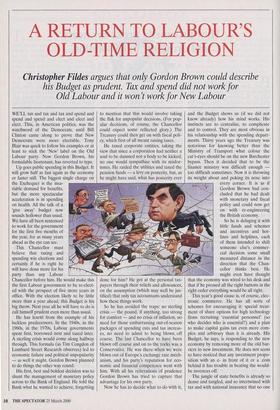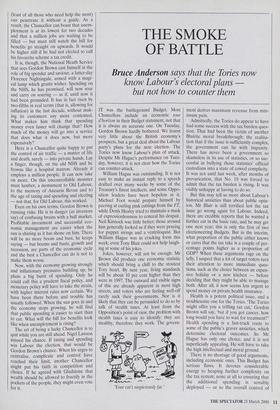A RETURN TO LABOUR'S OLD-TIME RELIGION
Christopher Fildes argues that only Gordon Brown could describe
his Budget as prudent. Tax and spend did not work for Old Labour and it won't work for New Labour
WE'LL tax and tax and tax and spend and spend and spend and elect and elect and elect. This, in American politics, was the watchword of the Democrats, until Bill Clinton came along to prove that New Democrats were more electable. Tony Blair was quick to follow his examples or at least to stick the 'New' label on the Old Labour party. Now Gordon Brown, his formidable lieutenant, has reverted to type.
Up goes public spending in this Budget. It will grow half as fast again as the economy or faster still. The biggest single charge on the Exchequer is the insa- tiable demand for benefits, but the more spectacular acceleration is in spending on health. All the talk of a 'give away' budget now sounds hollower than usual. We have all been sentenced to work for the government for the first five months of the year, for as many years ahead as the eye can see.
This Chancellor must believe that taxing and spending win elections and certainly if he is right he will have done more for his party than any Labour Chancellor before him. He would make this the first Labour government to be re-elect- ed with the prospect of five more years in office. With the election likely to be little more than a year ahead, this Budget is his big throw. Next year all he will have to do is call himself prudent even more than usual.
He has learnt from the example of his luckless predecessors. In the 1940s, in the 1960s, in the 1970s, Labour governments spent first, borrowed next and taxed later. A sterling crisis would come along halfway through. This formula (as Tim Congdon of Lombard Street Research observes) led to economic failure and political unpopularity — as well it might. Gordon Brown planned to do things the other way round.
His first, best and boldest decision was to shunt the management of monetary policy across to the Bank of England. He told the Bank what he wanted to achieve, forgetting to mention that this would involve taking the flak for unpopular decisions. (For pop- ular decisions, of course, the Chancellor could expect some reflected glory.) The Treasury could then get on with fiscal poli- cy, which first of all meant raising taxes.
He taxed corporate entities, taking the view that since a corporation had neither a soul to be damned nor a body to be kicked, no one would sympathise with its misfor- tunes. He raided the utilities and taxed the pension funds — a levy on posterity, but, as he might have said, what has posterity ever done for him? He got at the personal tax- payers through their reliefs and allowances, on the assumption (which may well be jus- tified) that only tax accountants understand how these things work.
So he has avoided the traps: no sterling crisis — the pound, if anything, too strong for comfort — and no crisis of inflation, no need for those embarrassing out-of-season packages of spending cuts and tax increas- es, no need to admit to being blown, off course. The last Chancellor to have been blown off course and on to the rocks was a Conservative. He was there when we were blown out of Europe's exchange rate mech- anism, and his party's reputation for eco- nomic and financial competence went with him. With all his reiterations of prudence Gordon Brown has tried to capture that advantage for his own party.
Now he has to decide what to do with it, and the Budget shows us (if we did not know already) how his mind works. His instincts are to centralise, to complicate and to control. They are most obvious in his relationship with the spending depart- ments. Thirty years ago the Treasury was notorious for knowing better than the Ministry of Transport what colour the cat's-eyes should be on the new Barchester bypass. Then it decided that to be the , finance ministry was difficult enough — too difficult sometimes. Now it is throwing its weight about and poking its nose into every corner. It is as if Gordon Brown had con- cluded that he had dealt with monetary and fiscal policy and could now get on with re-engineering the British economy.
So he is deluging it with little funds and schemes and incentives and hot- lines and helplines, each of them intended to shift someone else's commer- cial decision some small measured distance in the direction that the Chan- cellor thinks best. He
might even have thought that the economy was wired to his desk and that if he pressed all the right buttons in the right order everything would be all right. This year's good cause is, of course, elec- tronic commerce. He has all sorts of schemes for encouraging it: special treat- ment of share options for high technology firms recruiting 'essential personnel' (so who decides who is essential?) and a plan to make capital gains tax even more com- plex and arbitrary than it is already. His Budget, he says, is responding to the new economy by removing more of the old bar- riers to new investment. He does not seem to have noticed that any investment propo- sition with an e- in front of it or a .com behind it has trouble in beating the would- be investors off.
The jungle of state benefits is already so dense and tangled, and so intertwined with tax and with national insurance that no one (least of all those who need help the most) can penetrate it without a guide. As a result, the Chancellor can boast that unem- ployment is at its lowest for two decades and that a million jobs are waiting to be filled — but must still watch the bill for benefits go straight on upwards. It would be higher still if he had not elected to call his favourite scheme a tax credit.
It is, though, the National Heath Service that sees Gordon Brown cast himself in the role of big spender and saviour, a latter-day Florence Nightingale, armed with a magi- cal lamp which grants wishes. Spending on the NHS, he has promised, will now soar and carry on soaring — as if, until now it had been grounded. It has in fact risen by two-fifths in real terms (that is, allowing for inflation) in the last decade, without mak- ing its customers any more contented. What makes him think that spending money even faster will change that? How much of the money will go into a service that does what it does now, but more expensively? Here is a Chancellor quite happy to put the control of air traffic — a matter of life and death, surely — into private hands. Lay a finger, though, on the old NHS and he frowns like a hospital matron. Already it employs a million people. It can now take on more. On this uncontrollable monster must lumber, a monument to Old Labour, to the memory of Aneurin Bevan and to the age of taxing and spending and electing — not that, for Old Labour, this worked. Even on his own terms, Gordon Brown is running risks. He is in danger (as investors say) of confusing brains with a bull market. Profitable investment and successful eco- nomic management are easier when the sun is shining as it has shone on him. There will be no more boom and bust, he keeps saying — but booms and busts, growth and recession, are parts of the economic cycle and the best a Chancellor can do is not to make them worse.
Now, with the economy growing strongly and inflationary pressures building up, he plans a big burst of spending. Only he could call this a prudent fiscal policy, and monetary policy will have to take the strain, with higher interest rates now certain. We have been there before and trouble has usually followed. When the sun goes in and the economy stops growing, he will find that public spending is easier to start than to cut. What will the bill for benefits look like when unemployment is rising? The art of being a lucky Chancellor is to quit while you are still ahead. Nigel Lawson missed his chance. If taxing and spending win Labour the election, that would be Gordon Brown's chance. When his urges to centralise, complicate and control have reached their limit, another Chancellor might put his faith in competition and choice. If he agreed with Gladstone that wealth should be allowed to fructify in the pockets of the people, they might even vote for it.



































































 Previous page
Previous page